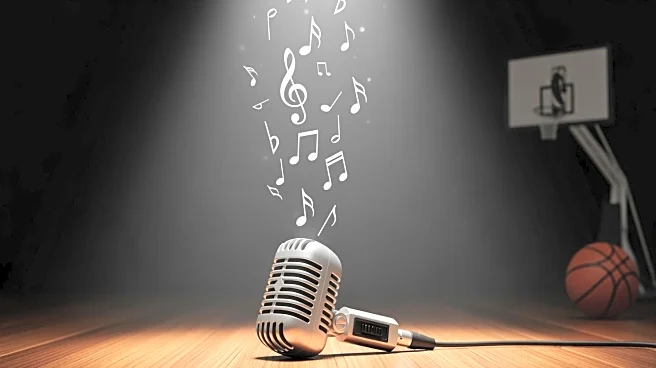What's Happening?
John Tesh's iconic 'Roundball Rock' theme song, originally composed for NBA broadcasts on NBC, is making a comeback as the NBA returns to the network. The theme, which became synonymous with basketball in the 1990s, was absent from broadcasts after the NBA left
NBC. Tesh, who composed the song in a unique manner while covering the Tour de France, has attempted to update the tune with a new version recorded in Nashville. Despite efforts to modernize it, fans preferred the original version, leading to its revival. Tesh's composition process involved using a metronome to match the tempo of basketball highlights, particularly Michael Jordan's fast breaks, which contributed to the song's energetic feel.
Why It's Important?
The return of 'Roundball Rock' to NBC is significant as it revives a nostalgic element for basketball fans who associate the theme with memorable NBA moments from the 1990s. This move could enhance viewer engagement and bring back a sense of tradition and excitement to NBA broadcasts. For NBC, reinstating the theme may strengthen its brand association with basketball, potentially attracting a larger audience. The decision reflects the enduring popularity of Tesh's composition and its impact on sports broadcasting, highlighting the cultural importance of music in enhancing sports experiences.
What's Next?
With the theme's return, NBC may explore further opportunities to leverage nostalgia in its sports programming, potentially reviving other classic elements from past broadcasts. John Tesh continues to tour widely, performing 'Roundball Rock' among other compositions, and may see increased demand for live performances of the theme. The network's decision could influence other broadcasters to consider similar nostalgic revivals to boost viewer engagement. Additionally, Tesh's ongoing work on sports-themed music may lead to new compositions that could be integrated into future broadcasts.
Beyond the Headlines
The revival of 'Roundball Rock' underscores the power of music in shaping cultural memories and its role in sports entertainment. It highlights the intersection of music and sports, where compositions can become iconic symbols of an era. The theme's return also reflects broader trends in media where nostalgia is used to connect with audiences emotionally, tapping into collective memories to enhance viewer loyalty. This development may inspire other artists and composers to create music that resonates with sports fans, potentially leading to new iconic themes.


















